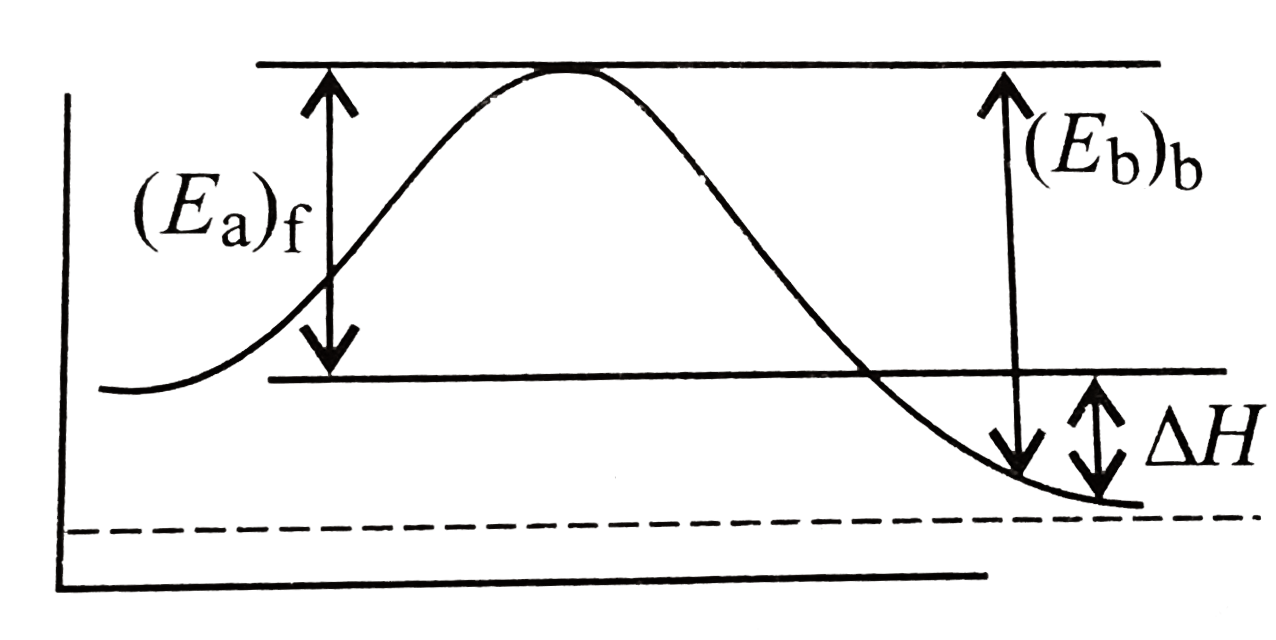An exothermic reaction X → Y has an activation energy 30 KJ mol−1 . If energy change ΔE during the reaction is -20 KJ, then the activation energy for the reverse reaction in KJ is __________ . (Integer answer)
The correct Answer is:50
To solve the problem, we need to determine the activation energy for the reverse reaction of an exothermic reaction given the activation energy for the forward reaction and the energy change (ΔE) during the reaction.
1. Identify Given Data:
- Activation energy for the forward reaction (Ea_forward) = 30 kJ/mol
- Energy change during the reaction (ΔE) = -20 kJ
2. Understand the Concept:
- In an exothermic reaction, the products have lower energy than the reactants. The energy change (ΔE) is negative, indicating that energy is released.
- The relationship between the activation energies of the forward and reverse reactions can be expressed as:
ΔE=Eforwarda−Ereversea
- Rearranging this gives:
Ereversea=Eforwarda−ΔE
3. Substitute the Values:
- Substitute the known values into the equation:
Ereversea=30kJ/mol−(−20kJ)
- This simplifies to:
Ereversea=30kJ/mol+20kJ
4. Calculate the Activation Energy for the Reverse Reaction:
- Therefore:
Ereversea=50kJ/mol
Final Answer:
The activation energy for the reverse reaction is 50 kJ/mol.
---
- Activation energy for the forward reaction (Ea_forward) = 30 kJ/mol
- Energy change during the reaction (ΔE) = -20 kJ
- In an exothermic reaction, the products have lower energy than the reactants. The energy change (ΔE) is negative, indicating that energy is released.
- The relationship between the activation energies of the forward and reverse reactions can be expressed as:
ΔE=Eforwarda−Ereversea
- Rearranging this gives:
Ereversea=Eforwarda−ΔE
- Substitute the known values into the equation:
Ereversea=30kJ/mol−(−20kJ)
- This simplifies to:
Ereversea=30kJ/mol+20kJ
- Therefore:
Ereversea=50kJ/mol
The activation energy for the reverse reaction is 50 kJ/mol.
Topper's Solved these Questions
- BOOK - JEE MAINS PREVIOUS YEARCHAPTER - JEE MAIN 2021EXERCISE - CHEMISTRY (SECTION-A)20videos
JEE MAIN 2021
- BOOK - JEE MAINS PREVIOUS YEARCHAPTER - JEE MAIN 2021EXERCISE - CHEMISTRY (SECTION-B)10videos
JEE MAIN 2021
- BOOK - JEE MAINS PREVIOUS YEARCHAPTER - JEE MAIN 2021EXERCISE - SECTION-A100videos
JEE MAIN 2021
- BOOK - JEE MAINS PREVIOUS YEARCHAPTER - JEE MAINEXERCISE - CHEMISTRY150videos
JEE MAIN
- BOOK - JEE MAINS PREVIOUS YEARCHAPTER - JEE MAIN 2022EXERCISE - Question561videos
JEE MAIN 2022
Similar Questions
An exothermic reaction X→Y has an activation energy of 90kJmol−1 of X and the heat of reaction is 250kJ. Find the activation energy of the reaction Y→X.
View SolutionAn endothermic reaction A→B has an activation energy as K KJ Mol −1 of A . If energy change of the reaction is Y KJ , the activation of the reverse reaction is
View Solution
Knowledge Check
- Question 1 - Select One
An exothermic reaction A → B has an activation energy of X kJ mol−1 of A. If the energy change in the reaction is Y kJ, then the activation energy of the backward reaction will be
A−XBY-YCY-XDX + Y - Question 2 - Select One
An endothermic reaction A → B has an activation energy as × kJ mo1−1 of A. If energy change of the reaction is y kJ, the activation energy of the reverse reaction is :
A−xBx - yCx + yDy - x - Question 3 - Select One
An endothermic reaction A ⇔ B has an activation energy as x kJ mol−1 of A. If energy change of the reaction is y kJ, the activation energy of the reverse reaction is
A−xBx-yCx+yDy-x
In an exothermic reaction X→Y, the activation energy is 100kJmol−1 of X. The enthalphy of the reaction is −140kJmol−1. The activation energy of the reverse reaction Y→X is
 View Solution
View SolutionAn exothermic reaction A→B has an activation energy of 17kJ per mole of A. The heat of the reaction is 40kJ. Calculate the activation energy for the reverse reaction B→A.
View SolutionAn exothermic reaction A→B has an activation energy of 17kJ per mole of A. The heat of the reaction is 40kJ. Calculate the activation energy for the reverse reaction B→A.
View SolutionAn exothermic reaction A→B has an activation energy of 17kJ per mole of A. The heat of the reaction is 40kJ. Calculate the activation energy for the reverse reaction B→A.
View SolutionIn an exothermic reaction A→B, the activation energy of the forward reaction is 200kJmol−1. The enthalpy of the reaction is 280kJmol−1. The activation energy of the reverse reaction B→A is
View Solution

